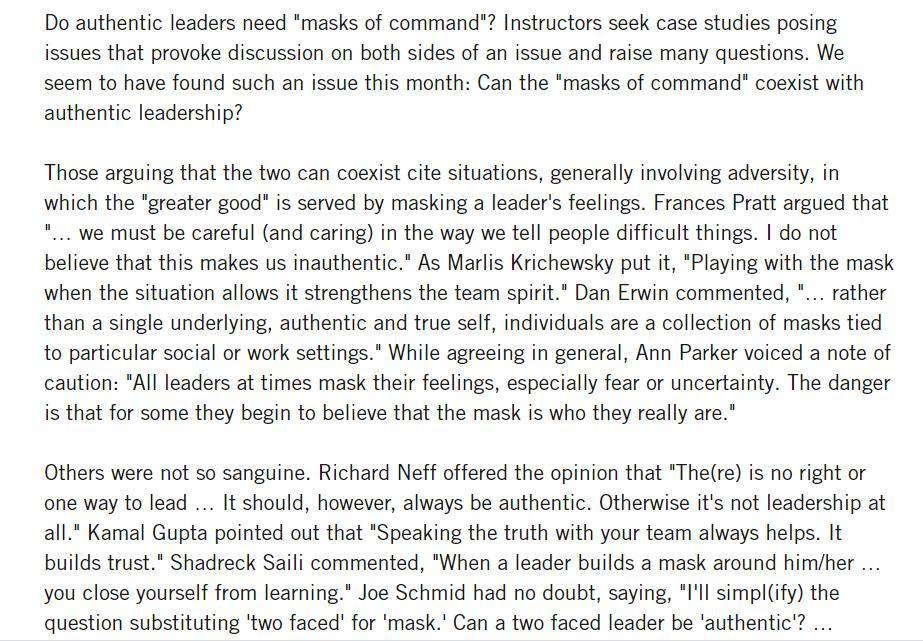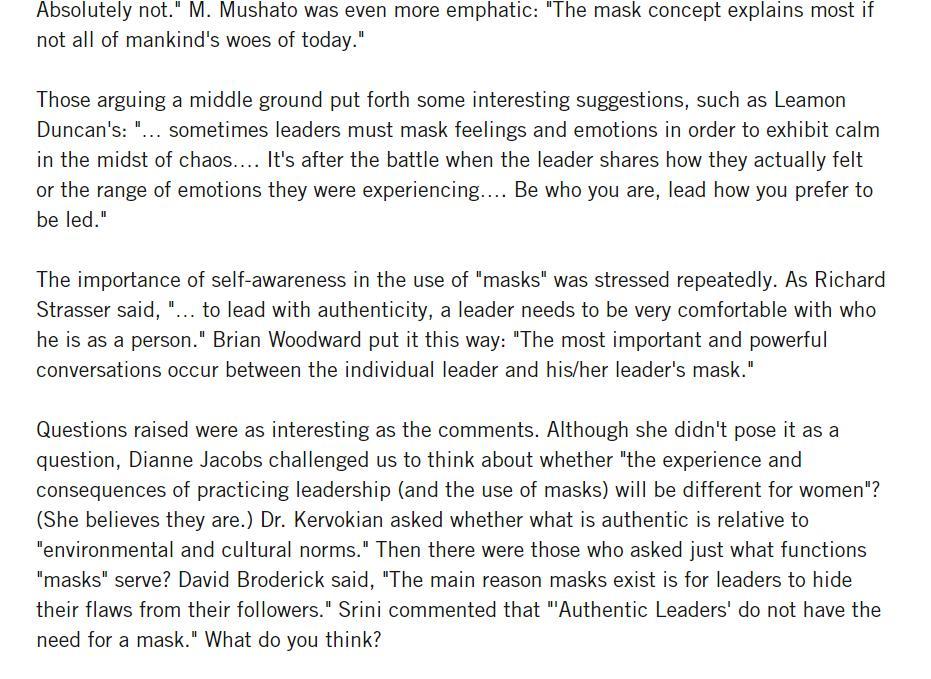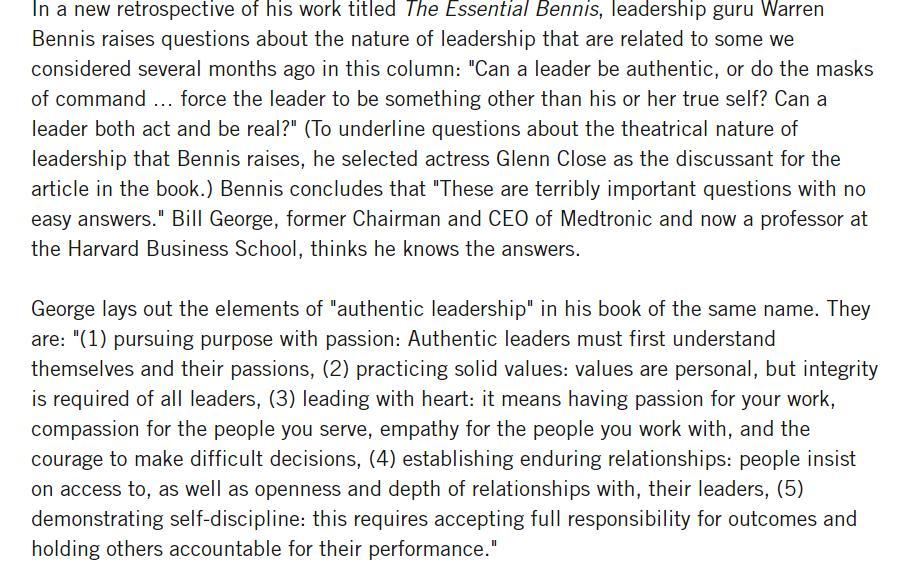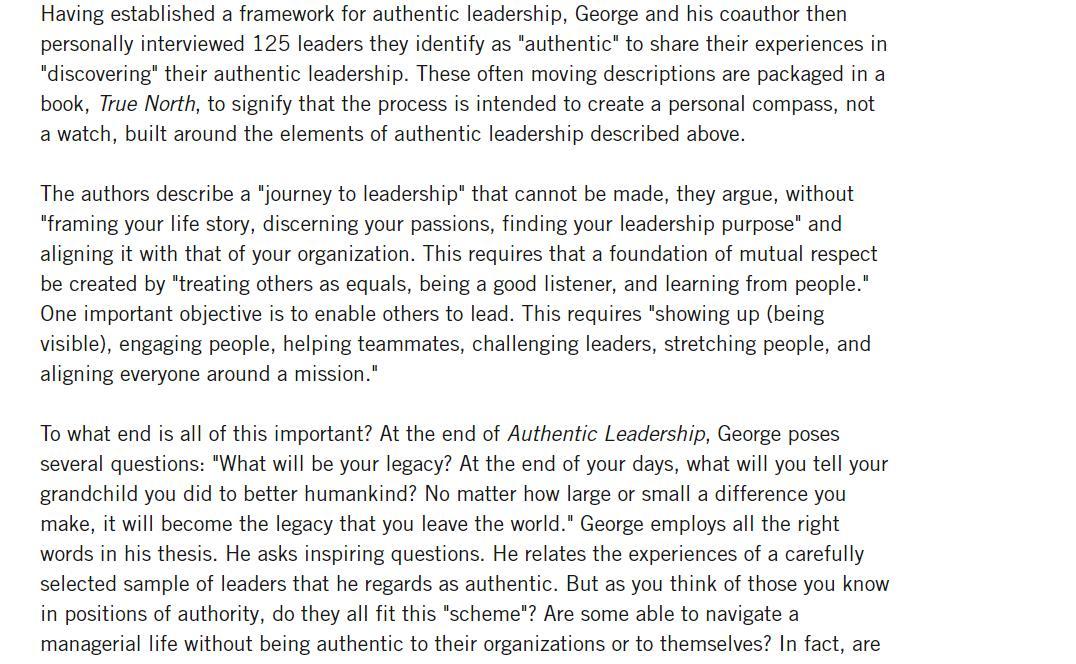Answered step by step
Verified Expert Solution
Question
1 Approved Answer
How address this article Address self-fulfilling prophesies, expectations, personal behavior and the workplace environment. Post the salient points that these articles speak to and describe
How address this article Address self-fulfilling prophesies, expectations, personal behavior and the workplace environment. Post the salient points that these articles speak to and describe what concrete actions you will employ in the workplace when provided the opportunity of leadership.





Do authentic leaders need masks of command ? Instructors seek case studies posing issues that provoke discussion on both sides of an issue and raise many questions. We seem to have found such an issue this month: Can the masks of command coexist with authentic leadership? Those arguing that the two can coexist cite situations, generally involving adversity, in which the greater good is served by masking a leader s feelings. Frances Pratt argued that ... we must be careful (and caring) in the way we tell people difficult things. I do not believe that this makes us inauthentic. As Marlis Krichewsky put it, Playing with the mask when the situation allows it strengthens the team spirit. Dan Erwin commented, ... rather than a single underlying, authentic and true self, individuals are a collection of masks tied to particular social or work settings. While agreeing in general, Ann Parker voiced a note of caution: All leaders at times mask their feelings, especially fear or uncertainty. The danger is that for some they begin to believe that the mask is who they really are. Others were not so sanguine. Richard Neff offered the opinion that The(re) is no right or one way to lead ... It should, however, always be authentic. Otherwise it s not leadership at all. Kamal Gupta pointed out that Speaking the truth with your team always helps. It builds trust. Shadreck Saili commented, When a leader builds a mask around him/her ... you close yourself from learning. Joe Schmid had no doubt, saying, I ll simpl(ify) the question substituting two faced for mask. Can a two faced leader be authentic ? ... Absolutely not. M. Mushato was even more emphatic: The mask concept explains most if not all of mankind s woes of today. Those arguing a middle ground put forth some interesting suggestions, such as Leamon Duncan s: ... sometimes leaders must mask feelings and emotions in order to exhibit calm in the midst of chaos.... It s after the battle when the leader shares how they actually felt or the range of emotions they were experiencing.... Be who you are, lead how you prefer to be led. The importance of self-awareness in the use of masks was stressed repeatedly. As Richard Strasser said, ... to lead with authenticity, a leader needs to be very comfortable with who he is as a person. Brian Woodward put it this way: The most important and powerful conversations occur between the individual leader and his/her leader s mask. Questions raised were as interesting as the comments. Although she didn t pose it as a question, Dianne Jacobs challenged us to think about whether the experience and consequences of practicing leadership (and the use of masks) will be different for women ? (She believes they are.) Dr. Kervokian asked whether what is authentic is relative to environmental and cultural norms. Then there were those who asked just what functions masks serve? David Broderick said, The main reason masks exist is for leaders to hide their flaws from their followers. Srini commented that Authentic Leaders do not have the need for a mask. What do you think? In a new retrospective of his work titled The Essential Bennis, leadership guru Warren Bennis raises questions about the nature of leadership that are related to some we considered several months ago in this column: Can a leader be authentic, or do the masks of command... force the leader to be something other than his or her true self? Can a leader both act and be real? (To underline questions about the theatrical nature of leadership that Bennis raises, he selected actress Glenn Close as the discussant for the article in the book.) Bennis concludes that These are terribly important questions with no easy answers. Bill George, former Chairman and CEO of Medtronic and now a professor at the Harvard Business School, thinks he knows the answers. George lays out the elements of authentic leadership in his book of the same name. They are: (1) pursuing purpose with passion: Authentic leaders must first understand themselves and their passions, (2) practicing solid values: values are personal, but integrity is required of all leaders, (3) leading with heart: it means having passion for your work, compassion for the people you serve, empathy for the people you work with, and the courage to make difficult decisions, (4) establishing enduring relationships: people insist on access to, as well as openness and depth of relationships with, their leaders, (5) demonstrating self-discipline: this requires accepting full responsibility for outcomes and holding others accountable for their performance. Having established a framework for authentic leadership, George and his coauthor then personally interviewed 125 leaders they identify as authentic to share their experiences in discovering their authentic leadership. These often moving descriptions are packaged in a book, True North, to signify that the process is intended to create a personal compass, not a watch, built around the elements of authentic leadership described above. The authors describe a journey to leadership that cannot be made, they argue, without framing your life story, discerning your passions, finding your leadership purpose and aligning it with that of your organization. This requires that a foundation of mutual respect be created by treating others as equals, being a good listener, and learning from people. One important objective is to enable others to lead. This requires showing up (being visible), engaging people, helping teammates, challenging leaders, stretching people, and aligning everyone around a mission. To what end is all of this important? At the end of Authentic Leadership, George poses several questions: What will be your legacy? At the end of your days, what will you tell your grandchild you did to better humankind? No matter how large or small a difference you make, it will become the legacy that you leave the world. George employs all the right words in his thesis. He asks inspiring questions. He relates the experiences of a carefully selected sample of leaders that he regards as authentic. But as you think of those you know in positions of authority, do they all fit this scheme ? Are some able to navigate a managerial life without being authentic to their organizations or to themselves? In fact, are there times, as Bennis asks, when it is necessary to avoid being authentic? Are these contradictory notions? Or can the masks of command coexist with authentic leadership? What do you think?
Step by Step Solution
★★★★★
3.33 Rating (156 Votes )
There are 3 Steps involved in it
Step: 1
S elffulfilling prophesies expectations personal behavior and the workplace environment The articles address the issue of selffulfilling prophesies expectations personal behavior and workplace environ...
Get Instant Access to Expert-Tailored Solutions
See step-by-step solutions with expert insights and AI powered tools for academic success
Step: 2

Step: 3

Document Format ( 1 attachment)
62a0704dc3e34_455877.docx
120 KBs Word File
Ace Your Homework with AI
Get the answers you need in no time with our AI-driven, step-by-step assistance
Get Started


